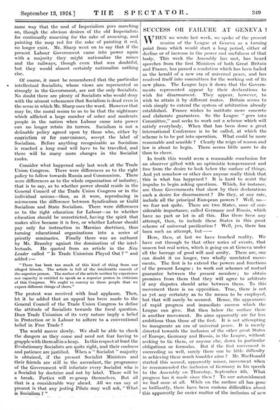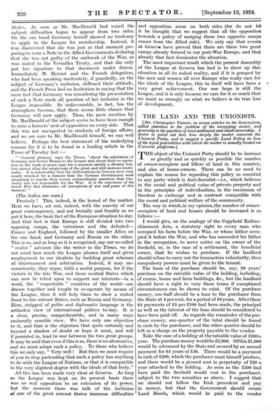SUCCESS OR FAILURE AT GENEVA 1 W HEN we wrote last
week, we spoke of the present session of the League at Geneva as a turning point from which would start a long period, either of decline or of increase in the power and usefulness of that body. This week the Assembly has met, has heard speeches from the first Ministers of both Great Britain and France, has passed a resolution which has been hailed as the herald of a new era of universal peace, and has resolved itself into committees for the working out of its new plans. The League lays it down that the Govern- ments represented appear by their declarations to wish for disarmament. They appear, however, to wish to attain it by different routes. Britain seems to wish simply to extend the system of arbitration already established. France wishes to institute more concrete and elaborate guarantees. So the League " goes into Committee," and seeks to work out a scheme which will satisfy everybody. When that has been done a great international Conference is to be called, at which the scheme is to be put into operation. What could be more reasonable and sensible ? Clearly the reign of reason and law is about to begin. There seems little more to do than to cheer.
In truth this would seem a reasonable conclusion for an observer gifted with an optimistic temperament and free from the desire to look below the surface of things. And yet somehow or other does anyone really think that this is what has happened ? It is hard to resist the impulse to begin asking questions. Which, for instance, are those Governments that show by their declarations such a desire for disarmament ? Do they, at any rate, include all the principal European powers ? Well, no— we fear not quite. There are two States, once of con- siderable importance, called Germany and Russia, which have no part or lot in all this. Has there been any attempt, then, to include these States in this great scheme of universal pacification ? Well, yes, there has been such an attempt, but— Here, then, at last we have touched reality. We have cut through to that other series of events, that unseen but real series, which is going on at Geneva under all the barrage of good will and amity. There are, one can doubt it no longer, two wholly unrelated move- ments. The first is to extend the powers and functions of the present League ; to work out schemes of mutual guarantee between the present members ; to obtain promises from them that they will agree to arbitrate if any disputes should arise between them. To this movement there is no opposition. True, there is not as yet any certainty as to the means to be employed, but that will surely be secured. Hence, the appearance of rapid progress and immediate success which the League can give. But then below the surface there is another movement. Its aims apparently are far less ambitious than those of the first. It is not attempting to inaugurate an era of universal peace. It is merely directed towards the inclusion of the other great States of Europe, Germany and Russia, in the League, without seeking to tie them, or anyone else, down to particular obligations or formulas. But if the first movement is succeeding so well, surely there can be little difficulty in achieving these much humbler aims ? Mr. MacDonald started this second, apparently minor, movement when he recommended the inclusion of Germany in his speech to the Assembly on Thursday, September 4th. What progress has it made since then ? To our astonishment we find none at all. While on the surface all has gone so brilliantly, there have been curious difficulties about this apparently far easier matter of the inclusion of new States. As soon as Mr. MacDonald had raised the subject difficulties began to appear from two sides. On the one hand Germany herself showed no tendency to apply to the League for membership. Instead, it was discovered that she was just at that moment pre- paring to issue a Note to the Allied Governments declaring that she was not guilty of the outbreak of the War, as was stated in the Versailles Treaty, and that she only put her signature to that document under duress. Immediately M. Herriot and the French delegation, who had been speaking moderately, if guardedly, on the subject of Germany's inclusion, stiffened their attitude, and the French Press had no hesitation in saying that the mere fact that Germany was considering the presentation of such a Note made all question of her inclusion in the League impossible. So unfavourable, in fact, has the atmosphere become, that there seems little chance that Germany will now apply. Thus, the mere mention by Mr. MacDonald of the subject seems to have been enough to raise a hornets' nest of opposition on every side. That this was not unexpected to students of foreign affairs, and we are sure to Mr. MacDonald himself, we can well believe. Perhaps the best statement of the underlying reasons for it is to be found in a leading article in the Times of Tuesday last :— " General phrases,' says the Times, ' about the admission of Germany and Soviet Russia to the League and about their co-opera- tion in the work of peace may for a moment satisfy a dreamy few. but cannot allay the misgivings of the great and still anxious multi- tudes. It is noteworthy that the deliberations in Geneva were very nearly wrecked by a rumour that the German Government were preparing to repeat their recent extraordinary assertion that Ger- many was not responsible for the War. It is the experience of the recent War that dominates all conceptions of war and peace at this moment.' " (The italics are ours.) Precisely ! This, indeed, is the kernel of the matter. Here we have, set out, indeed, with the suavity of our great contemporary, and not brutally and frankly as we put it here, the basic fact of the European situation to-day. And that fact is that Europe is still divided into two opposing camps, the victorious and the defeated— France and England, followed by the smaller Allies on the one hand, and Germany and Russia on the . other. This is so, and as long as it is recognized, say our so-called " realist " advisers like the writer in the Times, we do not mind how much the League pleases itself and gives employment to our idealists by building great schemes of disarmament and arbitration. Indeed, it may un- eonsciously, they argue, fulfil a useful purpose, for if the victors in the late War, and those neutral States which can now be relied upon to support our interests—in a word, the " respectable " countries of the world—are drawn together and taught to co-operate by means of the League, then it will help them to show a united front to the outcast States, such as Russia and Germany. Here, stripped of polite and diplomatic language is the orthodox view of international politics to-day. It is a clear, precise, comprehensible, and in many ways. eminently sensible view. We have only one objection to it, and that is the objection that quite certainly and beyond a shadow of doubt or hope it must, and will if persisted in, lead to war between the two great groups. It may be said that even if this is so, there is no alternative, and we must adopt such a policy. . To those who believe this we only say, " Very well I But then we must require of you to stop pretending that such a policy has anything to do with the League of. Nations, or that it is compatible in the very slightest degree with the ideals of that body."
All this has been made very clear at Geneva. As long as the League was .kept on its present basis there was no real opposition to an extension of its power, but the moment there was talk of the inclusion of one of the great outcast States immense difficulties and opposition arose on both sides (for do not let it be thought that we suggest that all the opposition towards a policy of merging these two opposite camps comes from the Allied side). We only say that events at Geneva have proved that there are these two great camps already formed in our post-War Europe,- and that already that fact dominates the situation.
The most important result which the present Assembly of the _League at Geneva has had is to show. up this situation in all its naked reality, and if it is grasped by the men and women all over Europe who really care for the ideals of the League, this in itself will have been a very great achievement. Our one hope is still the League, and it is only because we care for it so much that we insist so strongly on what we believe is its true line of development.



































 Previous page
Previous page